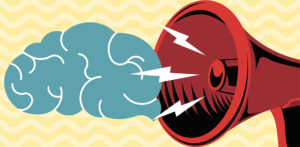The “Fake News” We Tell Ourselves

Psychotherapists say that therapy is merely holding a mirror up to ourselves, just as Socrates championed the wisdom of “know thyself,” which was carved in the forecourt of the Temple of Apollo at Delphi. We spend a lifetime trying to really understand ourselves, but how effective are we? How much do we really understand who we are? In recent years science has explored this very question, and what we’re learning has implications for all humanists.
We know that much of who we are is hidden from our view. We’ve learned that the subconscious plays a major role in our thinking. The modern theory of the brain is that we are not of a single mind but, as Marvin Minsky, the father of artificial intelligence says, a society of minds. I like to think of it as a committee of minds, all competing and interacting. We don’t see any of this battle. There is even a portion of the brain that psychologist Michael Gazzaniga calls “the interpreter” because it makes up stories for what we believe and how we behave.
We are biopsychosocial beings. Our biology plays a huge but subtle role in guiding our behavior. Our instinctual urges are hardwired into us and can only be overcome with difficulty. Our instincts are governed by evolution’s two main drives, survival and reproduction. For example, in addicts the “reward circuit” in their brain is hijacked and their body literally thinks it will die if they don’t get their drug of choice. They will give up on their health, career, self-respect, and family because survival is an evolutionary impulse that’s hard to overcome.
We are also products of our culture. Postmodernism even posits that everything is a social construction and our social experiences shape everything we believe and do. In Western society we accept the search for freedom, a concept largely unknown in many Eastern societies. So much of who we are is motivated by power and control.
Moreover, it is argued in academia that free will is merely an illusion, that everything we think and do is determined by our history. The argument is that we live in a deterministic, naturalistic world. There are hundreds of experiments that cast consciousness as nothing more than a deterministic result of all our minds’ inner workings. In one such experiment, a subject mentally recorded when they chose to push a button while watching a rotating clock. The times the subject said they freely chose to push the button came after the signal to the hand was already traveling down the arm to push the button. It may be that consciousness is intended to give us a “story” as to why we are doing something.
Ultimately, William James was correct when he said, “A great many people think they are thinking when they are merely rearranging their prejudices.” This is the core concern. At a time when everyone is concerned about lies, fake news, manipulation, and the strangulation of free thought in the public square, we can never be sure of our own biases and prejudices—the “fake news” we tell ourselves.
Humanism is contingent on our ability to take reasoned actions for the greater good in the face of the disquieting realization of our limitations. As humanists we must utilize humility and self-examination to discover how we may be merely rearranging our own prejudices. We have to subdue our own demons before we try to tackle the world’s.
